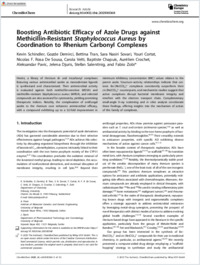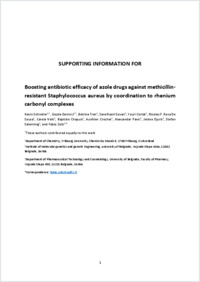Boosting Antibiotic Efficacy of Azole Drugs against Methicillin‐Resistant Staphylococcus Aureus by Coordination to Rhenium Carbonyl Complexes
DOKPE
- Schindler, Kevin ORCID University of Fribourg
- Demirci, Gozde ORCID University of Fribourg
- Tran, Bettina University of Fribourg
- Sovari, Sara Nasiri University of Fribourg
- Cortat, Youri ORCID University of Fribourg
- De Sousa, Nicolas F. Rosa University of Fribourg
- Velti, Carola University of Fribourg
- Chapuis, Baptiste University of Fribourg
- Crochet, Aurélien ORCID University of Fribourg
- Pavic, Aleksandar ORCID University of Belgrade, Serbia
- Djuris, Jelena ORCID University of Belgrade, Serbia
- Salentinig, Stefan University of Fribourg
- Zobi, Fabio ORCID University of Fribourg
- 2025
Published in:
- ChemBioChem. - Chichester, UK: Wiley. - 2025
English
In this study, a library of rhenium di- and tricarbonyl complexes featuring various antimicrobial azoles as monodentate ligands was synthesized and characterized. Their antimicrobial activity was evaluated against both methicillin-sensitive (MSSA) and methicillin-resistant (MRSA) Staphylococcus aureus, and selected compounds were also assessed for cytotoxicity, yielding promising therapeutic indices. Notably, the complexation of antifungal azoles to the rhenium core enhanced antimicrobial efficacy, with a compound exhibiting up to a 32-fold improvement in MIC values relative to the parent azole. Structure-activity relationships indicated that cationic fac-[Re(CO)₃]⁺ complexes consistently outperformed their cis-[Re(CO)₂]⁺ counterparts, and mechanistic studies suggest that active complexes disrupt bacterial membrane integrity and interfere with the electron transport chain. Complementary small-angle X-ray scattering and in silico analysis corroborate these findings, offering insights into the mechanism of action of this family of complexes.
- Faculty
- Faculté des sciences et de médecine
- Department
- Département de Chimie
- Language
-
- English
- Classification
- Chemistry
- License
- Open access status
- hybrid
- Identifiers
-
- DOI 10.1002/cbic.202500368
- ISSN 1439-4227
- ISSN 1439-7633
- Persistent URL
- https://folia.unifr.ch/unifr/documents/332414
Other files
Statistics
Document views: 50
File downloads:
- chembiochem-2025-schindler-boostingantibioticefficacyofazoledrugsagainstmethicillinresistantstaphylococcus: 42
- esi_cbic.202500368_r1: 37

